This article was written by Luna Rose. Luna Rose is an autistic community member who specializes in writing and autism. She holds a degree in Informatics and has spoken at college events to improve understanding about disabilities. Luna Rose leads wikiHow's Autism Project.
This article has been viewed 23,304 times.
A special interest is sort of like an intense or a passionate hobby, which provides balance, meaning and a sense of well-being to autistic people's lives. The benefits are innumerable: from increased self-esteem to elevated mood to potential career paths. If you love a child, teen, or adult on the autism spectrum, you may wonder how to encourage their interest while maintaining a proper balance. With a little effort and individual attention, you can do just that.
Steps
Using Gifts and Activities
-
1Check out library books relating to their interest. They can read about their favorite things at their own leisure, without the expense of constantly buying new books.
-
2Buy gifts related to the latest interest. This will ensure that they like whatever you give them, and they will feel understood and appreciated. Here are some examples of good gifts:
- Arts and craft kits (e.g. bead bracelets with cat-shaped beads)
- Home and kitchen ware that matches the interest (e.g. cat-shaped oven mitts in their favorite color)
- Books (a book detailing types of cats)
- Outfits (a shirt with a cute cat picture on it)
- Toys (a stuffed cat)
Advertisement -
3Incorporate the special interest into everyday purchases. This is particularly easy if you're a parent or guardian. Whenever your child needs something new, see if any have designs related to the special interest. For example, your son could have shirts with pictures of cars, toothpaste with cartoon cars on the tube, car-themed bed sheets, etc. Treat it the same way you treat favorite colors or favorite cartoon characters.
-
4Buy things that can help them engage in their interests with others. Sharing an interest is not only a good way for you to bond with and relate to the autistic person, but for others to bond for them too. For example, if your daughter loves chemistry, you can buy:
- Age-appropriate chemistry sets to play with her siblings together
- Science books that she can read to her little brother, or that her older sister can read to her
- Board games with a science theme
- Toys that combine science and one of her siblings' interests (e.g. a dinosaur science kit with her T. Rex-loving brother)
-
5Encourage others to do the same. For instance, when sending birthday invitations, mention the child/teen's special interests, so the attendees can pick out appropriate gifts. Relatives will also appreciate this knowledge, in case they want to bring presents or talk one-on-one with the autistic person.
Offering Social Support
-
1Talk about their interests together. This is a great way to get to know them and see inside their minds. Ask questions and engage in reciprocal conversation.
-
2Set boundaries as needed. While special interest talk can be a great bonding opportunity, you may find that the autistic person is more energetic than you are, so you might want to talk about something else. Let them know that you are changing the subject first instead of suddenly saying something else, as this may make them feel as though you didn't hear them or they're being ignored. You can also offer compromises. Here are examples of what you can say:
- "I'm feeling a little worn out, so I'm going to get some alone time now."
- "I need to go finish my work. Let's talk more later."
- "Dogs are great, but I'm a little tired of talking about them right now. How was your day?"
- "We can talk about Russian history for a little longer, and then I'd like to talk about something else."
- "We can talk more about birds later. Do you want to tell me about that painting you were working on?"
Tip: You can also plan natural breaks: for example, talking about submarines during the car ride, and then doing something else afterwards.
-
3Find clubs and social opportunities involving their interest. This way, they can learn more about their interests from other experts, and talk with people who love the subject just as much as they do. Search their school, church, and local area for organizations that provide opportunities.
-
4Help them make autistic friends. Autistic people can relate to the intensity of the interest. It's even possible that they may have similar special interests, meaning your loved one can enjoy long and detailed conversations.
- People with ADHD also experience intense interests.
- If the person uses social media, you can encourage them to find online communities relating to their special interest (such as a group online for fans of movies). They can also make friends that way - remember that online friends can still be friends.
-
5Take them to locations relating to the interest. If your autistic student loves fire trucks, call the fire department and see if they could arrange a class tour. If your son loves dance, take him to see The Nutcracker in the winter.
-
6Introduce them to people who share the same interests. Does your friend love to write short stories? Introduce her to your novelist uncle, or hook her up with your essayist/poet friend. This way, they can meet others one-on-one to discuss a topic they both love. They might end up making a very good friend!
-
7Step in if people laugh at or bully the autistic person. These strategies will help the autistic person find friendly people, but they won't shield them from mean people. Intervene if you see a problem, and comfort the autistic person by telling them that there's nothing wrong with who they are: "you're okay, they're mean."
- "Hey, he's my friend. Leave him alone."
- "That's rude."
- "There's nothing wrong with being passionate. Stop making fun of her."
- "Lay off."
- "Hey, (autistic person's name), come hang out with me!"
Teaching with Special Interests
If you're a teacher, therapist, parent, or guardian, you can incorporate the autistic person's passion when you teach them skills.
-
1Incorporate special interests into the learning process. They can create great examples and motifs. For example, if your student loves cars, you could:
- Use toy cars to demonstrate basic math facts—from counting to arrays
- Drive a toy car around a globe to demonstrate geography and distance
- Get a car-themed workbook
- Focus physics lessons on car mechanics
- Have them build a miniature vehicle using ordinary objects for a science/engineering project
-
2Investigate the field most closely related to the special interests. For example, an autistic person who loves robots might be interested in computer programming or engineering. Focus on these fields to see if the autistic person is interested. It may lead to a fun and fulfilling job someday.
-
3Incorporate the interests into functional play and therapy activities. If you're looking for building blocks to build fine motor skills, pick a set that comes with toy cats so they can build a home for them. If you want to increase strength, turn "animal walks" into pretending to be a cat. This will make it especially fun for them.
-
4Model good social skills when discussing the interest. Listen well, ask questions, and always be polite. Behave well, and encourage the autistic person to do the same. The following are all important skills:
- Nonjudgmental listening
- Asking questions
- Validating feelings
- Setting boundaries (e.g. "I need some alone time")
- Noticing when someone isn't actively engaging with you
-
5Explain the difference between talking to someone and talking at someone. Many autistic people don't automatically pick up this difference. They may talk at people, or may be afraid to talk about their interests at all for fear of being rude.
- Say what to watch for (lack of verbal responses, examples of impatient body language, appearing distracted)
- Explain how to turn a conversation if the person seems bored ("So how was your weekend?")
- Talk about how to tell when someone is interested, and that it's okay to monologue if their conversation partner wants them to
- Explain that it is never bad or wrong to want to share their passions with others.
-
6Realize that they will automatically learn many skills through their special interests. These skills will serve them well at school/work and in social situations. They may lay the foundation for a wonderful career!
- A teen who scours autism blogs is gaining great research skills and learning to look at multiple sides of an issue.
- A boy who goes to theater club is learning how to express himself and make friends.
- A girl who plays video games may someday design them.
-
7Don't overdo the teaching. Learning and improvement are great, but it should never be at the expense of stability or downtime. Keep things balanced, and make sure there's plenty of time for undirected fun!
Warnings
- If you're tired of talking about something, just say so and find something else to do. Don't let frustration build up and turn into a passive-aggressive attack on the autistic person.⧼thumbs_response⧽
- If you notice a teacher/parent/therapist trying to discourage the autistic person's special interest, take the person aside and tell them that you are not okay with this.⧼thumbs_response⧽
- Don't try to push them away from the things they love because you think their level of focus is "inappropriate." Imagine how you'd feel if everyone tried to stop you from doing your favorite things!⧼thumbs_response⧽


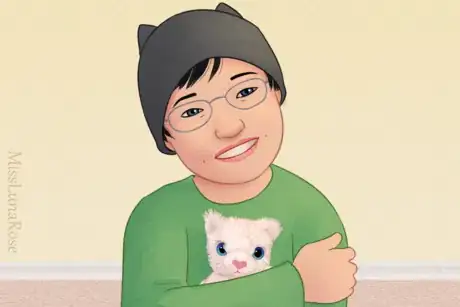
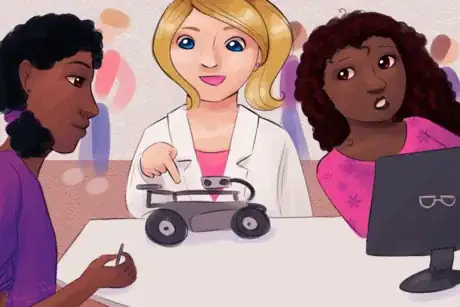
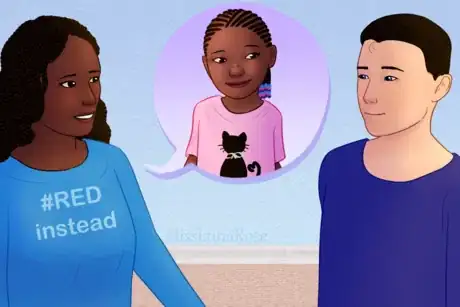
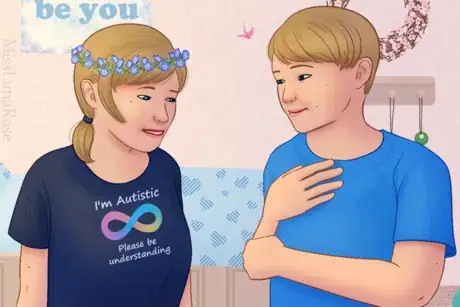


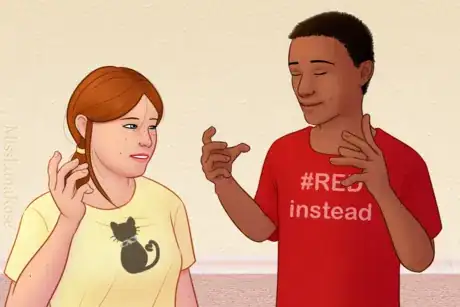
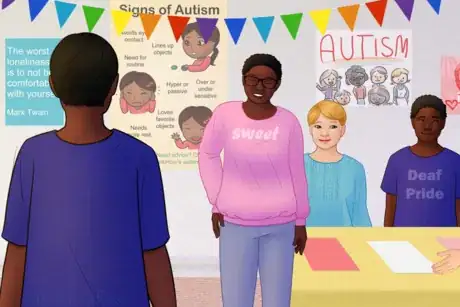


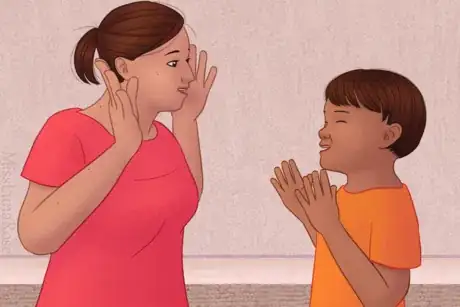

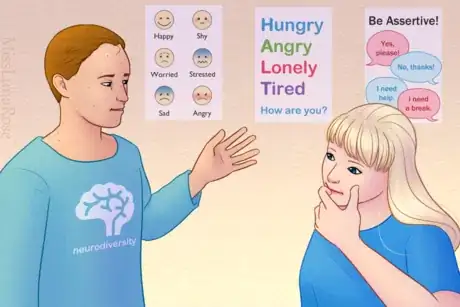
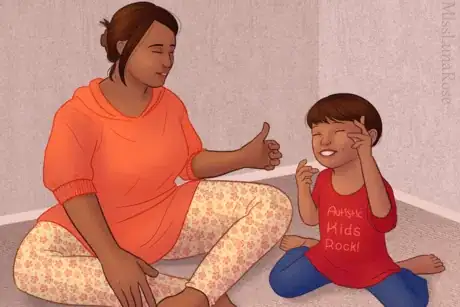


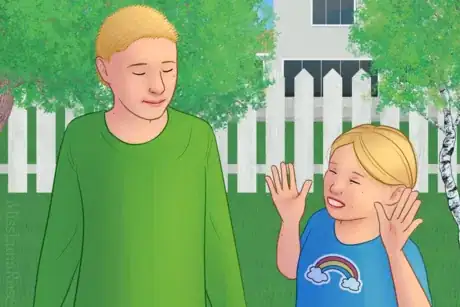


-Step-8.webp)


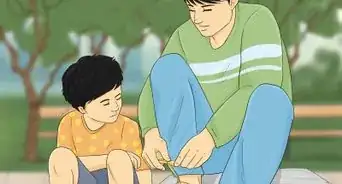
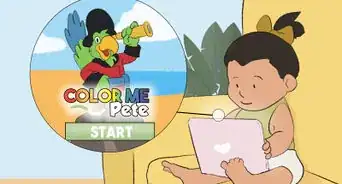











-Step-8.webp)




































Medical Disclaimer
The content of this article is not intended to be a substitute for professional medical advice, examination, diagnosis, or treatment. You should always contact your doctor or other qualified healthcare professional before starting, changing, or stopping any kind of health treatment.
Read More...